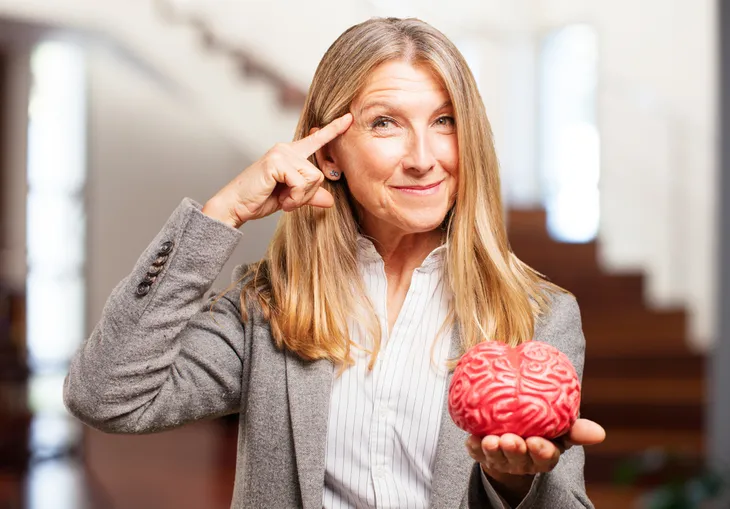It doesn’t take long to form a habit, but it can take months, even sometimes years to break a bad habit. Life can be overwhelming, busy, and stressful, but despite all this, it’s important for us to maintain a healthy lifestyle. In order to do this, we need to exercise regularly, eat healthy, and get lots of sleep. Doesn’t seem too hard, does it?
Unfortunately, a lot of people struggle to maintain these healthy habits. Instead, we develop bad habits that are not only unhealthy, but can actually be harmful to our brain. Staying up too late, stressing about work, and lounging around on the couch might seem harmless, but in reality these seemingly normal habits can be detrimental to our health. To keep our brain sharp and healthy, avoid these 12 bad habits that can actually age your brain…
Lack of Sleep
Getting an adequate amount of sleep each night will do wonders for your health! Unfortunately, many people struggle with a lack of sleep. This happens for a number of reasons, mainly because we all live really busy lifestyles and most of us don’t prioritize sleep.
A lack of sleep is a bad habit that can take a huge toll on your brain. According to WebMD, inadequate sleep puts a person at risk for dementia and Alzheimer’s disease. The source recommends maintaining regular sleep hours. If you’re someone who struggles to fall asleep at night then you should avoid alcohol, caffeine, and electronics in the evening. Create a new bedtime routine that is soothing and relaxing.
Poor Diet
When people want to lose weight the first thing they tend to do is start exercising. While regular movement and activity is super important, diet actually plays a much larger role than exercise. If you’re like me, creating a new exercise routine is a lot easier than breaking bad eating habits.
In addition to weight, eating healthy is also important for what’s going on inside the body. “Parts of the brain linked to learning, memory, and mental health are smaller in people who have lots of hamburgers, fries, potato chips, and soft drinks in their diet,” says WebMD. A healthier diet would include foods like berries, whole grains, nuts, and leafy green vegetables — all of which preserve brain function and slow mental decline.
Smoking
Even though we are all aware about the dangers of smoking, there are still millions of smokers around the world. The list of harmful effects from smoking is lengthy and one of them includes shrinking the brain, says WebMD. Sounds pretty scary! Trust us, it’s not a good thing. Smoking will also affect a person’s memory and makes a person twice as likely to develop dementia, as well as Alzheimer’s disease.
In addition to its negative effects on the brain, smoking also causes heart disease, diabetes, stroke, and high blood pressure.
Chronic Stress
We all get stressed from time to time — that’s life. No matter what career we’re in, where we live, our family life, we all encounter stress on a regular basis. Of course, some people have much more stress in their life and we all process stress differently, so what might not be that stressful for one person is extremely overwhelming for another. Stress can be good for us if experienced in moderate amounts. It keeps us on our toes, but chronic stress is very harmful to the brain.
Chronic stress puts an individual at risk for mental illness. VeryWell Mind refers to a study published in Molecular Psychiatry found that chronic stress can cause long-term changes to the brain which is why people who experience chronic stress are more likely to develop mood and anxiety disorders. Stress can also change the structure of the brain. Researchers from the University of California because stress creates an excess of myelin-producing cells affect the balance of white and gray matter in the brain. VeryWell Mind explains that “gray matter” is responsible for higher-order thinking and “white matter” is made up “of all axons that connect with other regions of the brain to communicate information.” The source also notes that stress has the ability to kill brain cells and shrink the brain.
Drinking Alcohol
Most people enjoy a drink or two on the weekends, and sometimes throughout the week. While there’s nothing wrong with having a drink, the key is moderation. It’s also important to remember that this moderate amount changes as we get older.
Everyday Health cites the American Geriatrics Society, who says even just a drink a day for an older man and half of one for an older woman could be too much. For the average adult, most research finds that men can enjoy two drinks a day, whereas women can have one a day. Anything more can be harmful to their health. “Excessive consumption can cause cognitive decline and may contribute to falls,” writes the source. “Alcohol can also interfere with some medications.”
Holding Onto Grudges
A lot of people are really good at holding a grudge. While it might seem satisfying to do so, the positive effects are slim to none. Ever heard that saying that holding onto anger is like drinking poison and hoping the other person will die? The same could be said for holding grudges.
Learning how to forgive and forget can be good for a person’s mental health and may even add years to their health. Not to mention the fewer wrinkles from not frowning as much! “Studies show forgiveness leads to better physical, psychological, and spiritual well-being. Benefits include lower blood pressure, less depression, less stress, and less anxiety,” writes Everyday Health.
Crash Diets
Crash diets are so tempting because let’s face it, who doesn’t want to shed a few pounds here or there? While it can be tempting to take the easy route by following a crash diet for a week or so, it’s not going to provide any long term results and it’s definitely not healthy. There is no quick fix to being healthy, there are only long term solutions.
Everyday Health cites research that found crash diets can actually make a person feel older by reducing their energy levels, concentration, and making them depressed and irritable. That’s a steep price to pay! “Crash dieting can also cause wrinkles and sagging because aging skin, which has less elasticity, doesn’t have time to adjust to the weight loss,” writes the source. “Weight management is important for senior health,” but the only healthy way to lose weight is by tackling a pound or two each week.
Sedentary Lifestyle
Like many of the other habits on this list, living a sedentary lifestyle can cause a number of negative health problems, including dementia. A sedentary lifestyle is when a person doesn’t exercise regularly, and spends most of their time sitting around. While it might not seem like you’re sitting around on the couch all day, many Americans struggle with this problem because they work at a desk. It’s extremely important for people who work at a desk all day long to get regular exercise outside of work or find ways to fit in small walks throughout the day.
People who live a sedentary lifestyle are more likely to get diabetes, heart disease, and have high blood pressure. All of these conditions are linked to Alzheimer’s, says WebMD. We understand it’s not easy for everyone to exercise on a daily basis and it doesn’t have to be extreme! A brisk half-hour walk each day will do wonders for your health. Make sure you’re making time for exercise at least three times a week.
Too Much Alone Time
Humans are social creatures — it’s in our nature. Some need it more than others, hence why we developed the term introvert and extrovert. When we talk about socialization, we’re not talking about interacting with people online through social media. Humans need face-to-face social interaction and they need it on a daily basis. This will help keep the mind sharp.
If we don’t get this kind of interaction, it leads to a real loss of connection. Research shows that people with more friends are happier and more productive. “They’re also less likely to suffer from brain decline and Alzheimer’s,” says WebMD. If you’re worried about how much time you spend alone, join a local club or activity that allows you to make new connections.
In addition to lack of socialization, WebMD notes that staying indoors can also be harmful to the brain. An insufficient amount of sunlight can lead to depression which slows down the brain. “Research also shows that sunlight helps keep your brain working well,” writes the source.
Loud Music
We all use earbuds to listen to music, some more than others. I personally use mine on a daily basis while walking the dog. While it’s probably not that surprising that listening to your headphones too loud will cause hearing loss (all it takes is 30 minutes for damage to occur, says WebMD), what you might not realize is that it can also lead to brain problems like Alzheimer’s and a loss of brain tissue.
“This may be because your brain has to work so hard to understand what’s being said around you that it can’t store what you’ve heard into memory,” explains WebMD. We don’t expect anyone to give up headphones entirely, but always make sure the volume is turned down low. It should never be higher than 60-percent of the maximum volume. Also, try not to use earbuds for more than a couple hours at a time.
Lack of Stimulation
Similar to our need for human interaction, we also need stimulation. This usually isn’t a problem for kids and teenagers or even young adults who are still in school, but after we’ve graduated and moved onto careers, many people lack the stimulation their brain needs to stay sharp. Of course, it’s not a problem for everyone. There are many people out there in very rewarding jobs that challenge them on a daily basis and require them to learn new things, but it’s not the case for everyone.
While most of us are probably happy to be out of school and not have to study, read, or solve difficult math problems, it’s a good idea to try and stay on top of these things. It doesn’t have to be as drastic as going back to school or signing up for an online class, there are little things you can do at home to keep the mind stimulated, such as reading books, doing crossword puzzles, read the newspaper, and avoid using shortcuts like calculators and spellcheck.
Overeating
In today’s society, most of us are overeating because the portions of our food are way too big. However, this is more directed at people who chronically overeat and it isn’t only specific to unhealthy eating habits. People who eat a normal, healthy diet can also be guilty of overeating. WebMD explains that overeating can be harmful because it disrupts the brain’s ability to “build a strong network of connections that help you think and remember.”
Other harmful effects of overeating include obesity, which puts a person at risk for heart disease, diabetes, and high blood pressure. All of these conditions have been linked to issues with the brain, including Alzheimer’s disease.
 Overeating
Overeating













